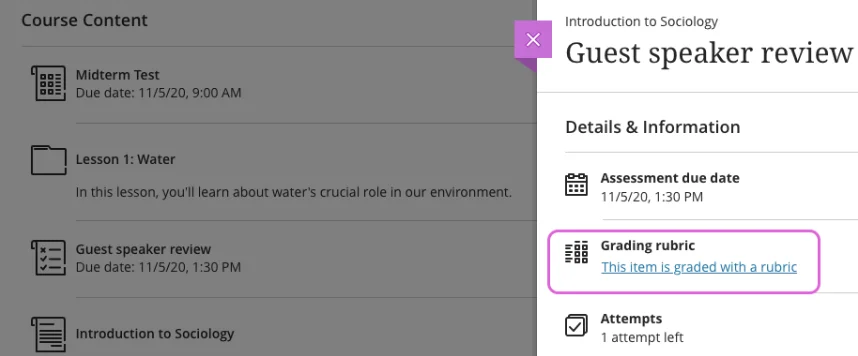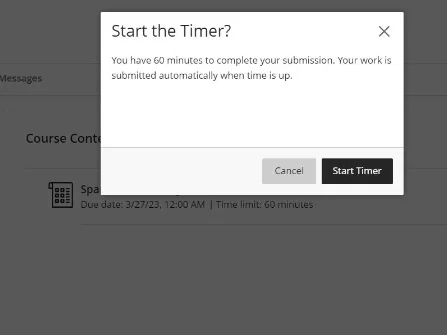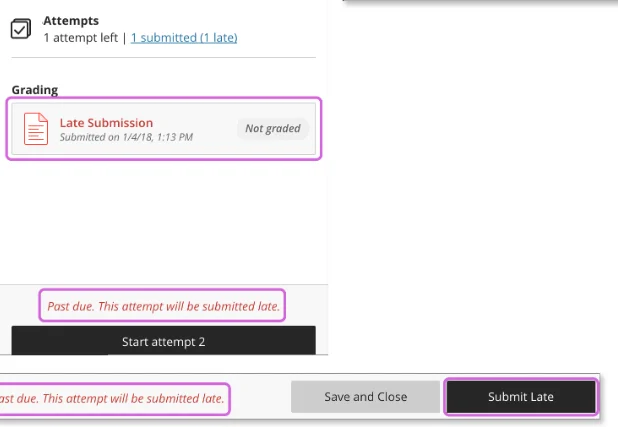Blackboard is a well-known platform in the world of online learning that has a particular late submission policy. Blackboard enforces special rules for submitting assignments and evaluations by default.
These deadlines could positively affect a student’s grades and overall academic development.
This post will go into Blackboard’s default late submission policy, highlighting its main features and outlining the potential consequences of not adhering to these deadlines.
Hacks and Tips for Blackboard’s Late Submission
1. Using the “Edit” Option for Late Submissions

While Blackboard’s late submission policy may be stringent, there is a handy “Edit” option that can be a lifesaver for students facing unexpected delays. Here’s how to make the most of it:
- Locate the assignment for which you missed the deadline and click on it.
- In the assignment window, find the “Edit” option. This feature allows you to change your submission even after the due date.
- Once in the editing mode, you can make any necessary changes or updates to your work.
- After revising your submission, make sure to save your changes and then resubmit the assignment.
- This “Edit” option can be a game-changer if you’ve realized an error or need to improve after the deadline.
However, you must be aware of your instructor’s policies regarding late submissions, as they might have rules or penalties in place.
Always communicate with your instructor if you anticipate or encounter issues meeting deadlines to seek their guidance and understanding.
2. The Power of the “Allow Additional Attempts” feature
Harnessing the “Allow Additional Attempts” feature in Blackboard can be a powerful strategy for managing late submissions.
Even so, this feature is a valuable lifeline for students who encounter unexpected obstacles or require extra time for quality work.
However, always communicate with your instructor about your situation and intentions, as they may need to adjust grading or provide guidance regarding late submissions.
Here’s how to utilize it effectively:
Go to the assignment or assessment you missed the deadline for on Blackboard
- Under the assignment, select the “Edit” option.
- Find the “Attempts Allowed” or similar option in the assignment settings. Increase the number of allowed attempts to permit a late submission.
- Now, you can submit your assignment as though it were a fresh attempt, bypassing the initial deadline.
3. Timing is Everything: The Best Time to Submit
Regarding last-minute submissions on Blackboard, timing can significantly impact your success.

First, ensure you know the time zone settings on Blackboard and align your submission accordingly. Professors often use a specific time zone for deadlines.
If possible, aim to submit your work ahead of the deadline. Technical glitches or heavy server traffic can lead to unexpected delays.
If you must submit close to the deadline, consider doing so during off-peak hours, like late at night or early morning, to avoid server congestion.
Before hitting “Submit,” thoroughly review your work to minimize potential mistakes or issues.
Remember that last-minute submissions should be a last resort. It’s always best to manage your time effectively to avoid unnecessary stress and ensure the quality of your work.
4. Making use of time zones to your advantage
Leveraging time zones to your advantage can be a strategic approach in various aspects of life, including online education.
When dealing with deadlines on platforms like Blackboard, ensure you comprehend the time zone used for assignment deadlines. It might be different from your local time zone.
If the platform operates in a different time zone, plan your schedule to align with that zone. This allows you to submit assignments before the actual local deadline.
When you adapt to the platform’s time zone, you can avoid the stress of last-minute submissions, technical glitches, or congestion, giving you a buffer for unforeseen issues.
Establish a working routine within the platform’s time zone to maintain consistency and minimize confusion.
Effectively utilizing time zones in online learning ensures you easily meet deadlines, reduce stress, and optimize your learning experience.
5. Mastering the Art of Editing
Mastering the art of editing after submitting an assignment on platforms like Blackboard can be a game-changer for improving your work.
Begin by locating your submitted assignment on the platform. Usually, there’s an option to review or access your previous submissions.
Carefully go through your work, pinpointing areas for improvement. Look for errors, clarity issues, or opportunities to enhance your content.
After identifying areas for improvement, make necessary revisions directly within your submission. Correct spelling and grammar, rephrase sentences and refine your arguments.
Once you’ve made improvements, resubmit your assignment. Some platforms, like Blackboard, allow multiple submission attempts, and your instructor may consider the latest version.
Editing post-submission showcases your commitment to quality and willingness to learn from mistakes.
However, always check your institution’s policies and communicate with your instructor about your intentions to ensure they are open to reviewing the revised work.
6. Leveraging Multiple Submission Attempts

Multiple submission attempts on platforms like Blackboard offer several benefits. They provide flexibility and promote a growth-oriented approach to learning.
Here’s how to leverage this feature effectively:
- Multiple attempts allow students to learn from their mistakes. You can review feedback, identify weaknesses, and implement improvements.
- Knowing you have multiple attempts can reduce the anxiety associated with high-stakes assignments. It encourages experimentation and creativity.
However, it’s crucial to avoid overusing this feature:
- Relying on multiple attempts as a safety net can lead to poor time management. Aim to submit your best work on the first attempt and use additional tries for refinement.
- Understand your instructor’s policy on multiple attempts. Excessive revisions may need to align with their expectations.
In essence, multiple submission attempts should be a tool for growth and improvement, not a crutch. Use them judiciously to enhance your learning experience.
7. Crafting a Winning Explanation
Crafting a convincing late submission explanation is an art that can make a difference in how your instructor views your situation.
Here’s what instructors typically look for in a well-written explanation:
- Clarity and Honesty: Clearly state the reason for your late submission. Honesty is key; provide a genuine and valid explanation.
- Responsibility: Take ownership of your actions. If the delay was within your control, acknowledge it.
- Documentation: If applicable, provide supporting documents like medical certificates or official notifications to substantiate your explanation.
- Apology: I express regret for the inconvenience caused by your late submission. A sincere apology demonstrates your professionalism.
- Request for Consideration: I request that your instructor consider your late submission and outline the steps you’ve taken to prevent future delays.
A well-crafted explanation shows your commitment to your work and respect for your instructor’s time.
It can lead to understanding and leniency in certain situations, but consistency in meeting deadlines remains essential.
Case Studies: Success Stories
Students commonly use the Blackboard Late Submission Hack for several valid reasons. These include unforeseen technical issues, internet connectivity problems, personal emergencies, health-related challenges, or overlapping deadlines.
Additionally, students may require extra time to refine their work and ensure its quality rather than rushing to meet an original deadline.
The hack offers a safety net for students facing unexpected obstacles, allowing them to communicate their situations transparently and request reasonable extensions.
When used ethically and responsibly, the Blackboard Late Submission Hack is valuable for accommodating unforeseen challenges while maintaining academic integrity.
Insights from instructors on accepting late submissions
- Instructors often consider individual circumstances, student communication, and work quality when accepting late submissions.
- Clear and early communication and valid reasons can influence their decision. However, adherence to established guidelines and fairness to all students remain essential considerations.
Dos and DON’Ts for Ethical Late Submissions
Ethical late submissions are about maintaining transparency, responsibility, and a commitment to your learning.

While instructors may exercise leniency in certain cases, it’s essential to approach late submissions with integrity and a genuine dedication to improvement.
Dos
- If you anticipate a late submission, inform your instructor immediately. Honest and early communication demonstrates responsibility.
- When explaining your late submission, be honest and provide valid reasons. Instructors appreciate transparency.
- Adhere to any specific late submission guidelines or policies outlined by your instructor or institution.
- Focus on delivering quality work, even if it means submitting late. Rushed or subpar work can harm your grades and learning.
- Use late submissions as learning experiences. Identify areas for improvement and apply those lessons to future assignments.
DON’Ts
- Avoid making late submissions a habit. Consistently missing deadlines can reflect poorly on your commitment to the course.
- Only submit late work after explaining the reason behind the delay. Instructors appreciate open communication.
- While it is important to explain your situation, avoid making excuses. Instructors value accountability.
- Refrain from assuming that your late submission will always be accepted, even with a valid reason. Respect your instructor’s discretion.
- Be sure to inform your instructor about late submission. Timely communication is key to resolving the situation ethically.
Conclusion
When used judiciously and ethically, the Blackboard late submission hack can provide students with opportunities for improvement and flexibility in meeting deadlines.
Students can navigate late submissions successfully by understanding the platform’s features, communicating effectively with instructors, and prioritizing the quality of work over deadlines. However, it’s crucial to remember that this hack should be a last resort, and responsible time management remains the key to a successful academic journey.
